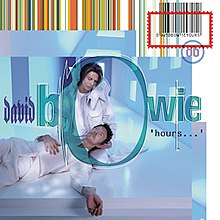Hours (David Bowie album)
| Hours | ||||
|---|---|---|---|---|
 |
||||
| Studio album by David Bowie | ||||
| Released | 21 September 1999 | |||
| Recorded | 1998–99 | |||
| Studio |
Various
|
|||
| Genre | Pop rock, | |||
| Length | 47:06 | |||
| Label | Virgin | |||
| Producer |
|
|||
| David Bowie chronology | ||||
|
||||
| Singles from Hours | ||||
|
||||
| Professional ratings | |
|---|---|
| Review scores | |
| Source | Rating |
| AllMusic | |
| Alternative Press | 4/5 |
| Entertainment Weekly | B– |
| The Music Box | |
| Pitchfork Media | 4.7/10 |
| Q | |
| Rolling Stone | |
| Select | |
| Spin | 6/10 |
| Uncut | |
Hours (stylised 'hours...' ) is the twenty-first studio album by English singer David Bowie. It was released on 4 October 1999 on Virgin Records. This was Bowie's final album for the EMI sub-label. It was the first complete album by a major artist available to download over the Internet, preceding the physical release by two weeks.
Hours was the first Bowie studio album to miss the US top 40 since his 1972 album The Rise and Fall of Ziggy Stardust and the Spiders from Mars and peaked at number 47.
Bowie and Gabrels wrote the songs for both Hours and the adventure video game Omikron: The Nomad Soul at the same time. According to Gabrels, they set up special writing sessions to write the music for these projects, then recorded demos in studios in Bermuda and Paris. Gabrels himself wrote over 3 hours of instrumental songs for the game (on top of the songs which he and Bowie had written together). Gabrels described these tracks as "more electronic and aggressive in nature than the Hours album" and suggested there would be an Omikron, The Nomad Soul instrumental album released the next year.
Hours was thought of as the soundtrack cd for Omikron as late as June 1999. In the game, released by Eidos Interactive about a month later than the album, Bowie played the role of a character called Boz, while his wife Iman appeared as an "incarnable" who introduced "virtual reincarnation". Furthermore, Bowie appeared together with Gabrels and Gail Ann Dorsey as "The Dreamers", a virtual band performing in bars around Omikron City. Characters in the game could also buy a virtual album that they could listen to in their apartments.Omikron: The Nomad Soul included eight songs, all of them also appeared on Hours ("We All Go Through" only as a Japanese bonus track, but also as a related single b-side and on the 2005 bonus disc). On a E3 press conference Bowie said about his work on the soundtrack:
"I moved right away from the stereotypical industrial game-music sound. My priority in writing music for Omikron was to give it an emotional subtext. It feels to me as though Reeves and I have achieved that. We both worked really close with Quantic Dream to come up with eight new songs for the game."
The game also included 34 "Instrumental Songs", of which 26 were written and performed by Gabrels and 8 by Bowie and Gabrels. Half of the tracks by Bowie and Gabrels were "easy listening versions" of some of the vocal songs. Some of the other "instrumental songs" would be further developed and released as b-sides, for instance "Awakened 2" is an instrumental version of "No One Calls" and "Thrust" (as heard during a rooftop fight with a demon) would become "1917". Only three songs on Hours were not from Omikron: "If I'm Dreaming My Life", "What's Really Happening" and "Brilliant Adventure" (although the latter was actually considered as incidental music for the game).
...
Wikipedia
